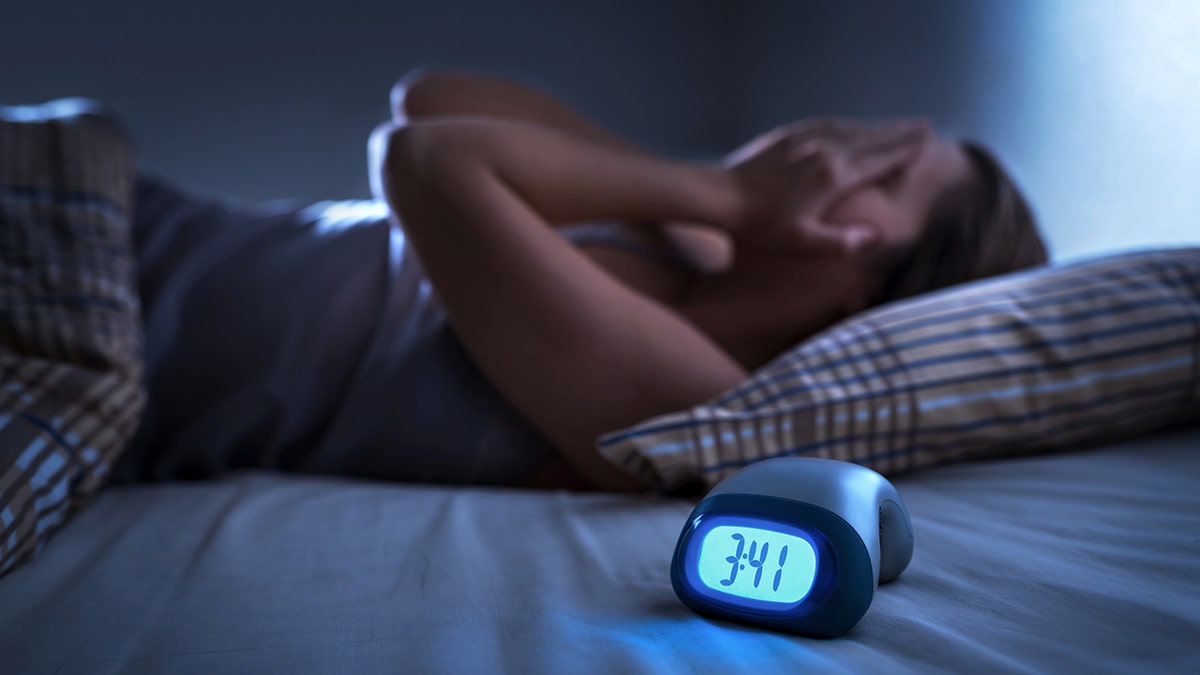Health
Disrupted sleep, plus nightmares could be linked to autoimmune diseases, experts say

Those who experience vivid nightmares and odd hallucinations might have an underlying autoimmune disease, a new study suggests.
An international research team led by scientists at the University of Cambridge and King’s College London explored the potential link between nightmares and hallucinations and systemic autoimmune rheumatic diseases.
The study, published in March in the journal eClinicalMedicine, included 676 people with lupus and 400 people from the medical field, as well as interviews with 69 people living with systemic autoimmune rheumatic diseases, SWNS reported.
STRUGGLING TO FALL ASLEEP? TRY THIS SIMPLE TRICK TO DRIFT OFF QUICKLY
Those with autoimmune diseases were asked about the timing of their neurological and mental health symptoms, such as disrupted sleep, hallucinations, depression and loss of balance.
Of the 29 symptoms listed, the participants were asked to rank such symptoms in the order in which they occurred relative to their disease flare-ups.
The study looked at not only the issues surrounding sleep, but also when the issues for participants began. (iStock)
The study found that three in five people experienced “vivid” and “distressing” nightmares that involved being trapped, attacked or falling — resulting in disrupted sleep.
One-third of those immune-compromised participants said they noticed the trend over a year before their lupus onset.
LUPUS EXPERT DEBUNKS 7 COMMON MYTHS ABOUT THE AUTOIMMUNE DISEASE: ‘NOT A DEATH SENTENCE’
Lupus is defined as “a disease that occurs when your body’s immune system attacks your own tissues and organs,” according to the Mayo Clinic.
One in four participants stated that they noticed hallucinations — although 85% said they didn’t experience the symptoms until the disease onset or later.

The study linked patients with an autoimmune disease, such as lupus, to disrupted sleep — including nightmares. (iStock)
Three in five people with lupus and one in three with other rheumatology-related conditions said they noticed an uptick in sleep disruptions just before their hallucinations would begin, according to SWNS.
The lead author of the study, Dr. Melanie Sloan of the University of Cambridge, noted in the study that in many cases, patients and doctors will not discuss mental health or neurological symptoms in relation to these diseases.
Three in five people with lupus noticed an uptick in sleep disruptions just before their hallucinations began.
“It’s important that clinicians talk to their patients about these types of symptoms and spend time writing down each patient’s individual progression of symptoms,” she said.
‘SLEEP DISORDER DROVE MY SON TO SUICIDE,’ NEW YORK MOTHER SAYS: ‘BROKE MY HEART’
Misdiagnosis was also mentioned in the study, as some participants said lupus and other autoimmune diseases were overlooked at first, SWNS reported.
For example, a participant from Scotland was diagnosed with borderline personality disorder at age 18 before being diagnosed with lupus at 19.

The study found that three in five people experienced disrupted sleep with “vivid” and “distressing” nightmares that involved being trapped, attacked or falling. (iStock)
“It was all very close together,” the participant said — noting that it was just a six-month period between “when my borderline personality disorder got under control and my lupus got under control,” SWNS said.
HAVING TROUBLE SLEEPING? IT COULD BE FOR THIS SURPRISING REASON, EXPERTS SAY
Dr. Raj Dasgupta, a California-based chief medical adviser for Sleepopolis, was not involved in the study but shared reaction to the findings with Fox News Digital.
Dasgupta, who is quadruple-board certified in pulmonary, sleep, internal and critical care medicine, said the study supports the perspective that a “high prevalence of neuropsychiatric symptoms, such as headaches, mood and fatigue” are commonly linked to patients with systemic lupus erythematosus (SLE).

Dr. Raj Dasgupta said that sleep issues among patients with SLE need to be discussed in order for people to achieve a better quality of life. (Sleepoplis)
SLE is a “chronic disease that can affect any organ, including the nervous system,” Dasgupta noted.
“This study also supports the fact that patients with SLE are subject to complications of its treatment, including steroid-related psychosis,” he added.
Misdiagnosis was also mentioned in the study.
Sleep issues are common in people with SLE, said Dasgupta, with over half of patients experiencing restlessness, poor sleep quality and difficulty falling asleep.
CLICK HERE TO SIGN UP FOR OUR HEALTH NEWSLETTER
“These issues can be caused by pain, medication effects and the disease’s impact on the brain,” he said.
Fox News Digital reached out to the eClinicalMedicine journal for further information.
Sleepoplis consists of a team of writers, product reviewers and sleep experts who provide reviews and sleep health content, per the company’s website.
For more Health articles, visit foxnews.com/health

Health
What Happens If You Eat Eggs Every Day? Nutritionists Share the Benefits

Sign Up
Create a free account to access exclusive content, play games, solve puzzles, test your pop-culture knowledge and receive special offers.
Already have an account? Login
Forgot your password?
Get back to the Sign In
Use left and right arrow keys to navigate between menu items.
Use escape to exit the menu.
Health
Ask a doctor: ‘I swallowed a bug — now what should I do?'

Most people have experienced that moment of discomfort when they realize a bug has wound up where it shouldn’t be — in their windpipe.
That includes Taylor Swift, who on more than one occasion has accidentally swallowed a bug while performing on stage in front of thousands of people.
It can be a startling and somewhat disgusting occurrence — but is this dangerous, or just a nuisance?
LOCAL DENGUE FEVER CASES CONFIRMED IN FLORIDA KEYS, SPREAD BY MOSQUITO BITES
Dr. Raj Dasgupta, a quadruple board-certified physician in California, shared with Fox News Digital the true impacts of accidentally swallowing a bug, and the best thing to do if it happens.
“Swallowing a bug can often happen accidentally when you’re eating or drinking outside, or if a bug flies into your mouth,” Dasgupta, who serves as chief medical advisor for Fortune Recommends, told Fox News Digital via email.
Dr. Raj Dasgupta, a quadruple board-certified physician in California, discussed the impact of accidentally swallowing a bug — and the best thing to do if it happens. (Sleepoplis)
“It can also happen if you’re talking or laughing outdoors. Sometimes it might even happen indoors if bugs are in your food or drink and you don’t realize it.”
ASK A DOCTOR: ‘HOW CAN I PREVENT SCARRING FROM BUG BITES AND POISON IVY?’
Swallowing a bug is usually not dangerous, Dasgupta noted.
“The stomach’s digestive acids usually break down the bug, and it is passed out of the body without causing harm,” he said.

“Swallowing a bug can happen accidentally when you’re eating or drinking outside, or if a bug flies into your mouth,” the doctor told Fox News Digital. (iStock)
If the bug carries harmful bacteria or parasites, however, it could cause gastrointestinal issues or allergic reactions, according to the doctor.
The type of bug can make a difference, he said.
“Bugs like beetles or ants are less of a concern, but bugs that are known to spread diseases — such as mosquitoes — might be riskier.”
If you happen to swallow a bug, drinking some water can help wash it down, Dasgupta said.

Taylor Swift has announced the accidental swallowing of bugs, mid-concert, on more than one occasion. (Marcelo Endelli/TAS23/Getty Images for TAS Rights Management)
“If you start feeling sick, like abdominal pain, vomiting or nausea, keep an eye on your symptoms,” the doctor said.
If you have severe stomach pain, ongoing vomiting, trouble breathing, or swelling, rash or itching, Dasgupta said to see a doctor.
CLICK HERE TO SIGN UP FOR OUR HEALTH NEWSLETTER
“If you know the bug could have diseases or if you have health conditions that might complicate things, it’s a good idea to get checked out to be safe,” he added.
For more Health articles, visit www.foxnews/health
Some bugs — including grasshoppers, beetles, termites, mealworms and even stink bugs — are actually considered edible in certain countries, and are prepared and eaten as part of meals, according to WebMD’s website.
Health
“I’m a Dietitian, and Here’s Why an Overly Restrictive Diet Can Backfire”

Sign Up
Create a free account to access exclusive content, play games, solve puzzles, test your pop-culture knowledge and receive special offers.
Already have an account? Login
Forgot your password?
Get back to the Sign In
Use left and right arrow keys to navigate between menu items.
Use escape to exit the menu.
-

 World1 week ago
World1 week agoOne dead after car crashes into restaurant in Paris
-

 Midwest1 week ago
Midwest1 week agoMichigan rep posts video response to Stephen Colbert's joke about his RNC speech: 'Touché'
-

 News1 week ago
News1 week agoVideo: Young Republicans on Why Their Party Isn’t Reaching Gen Z (And What They Can Do About It)
-

 News1 week ago
News1 week agoIn Milwaukee, Black Voters Struggle to Find a Home With Either Party
-

 Politics1 week ago
Politics1 week agoFox News Politics: The Call is Coming from Inside the House
-

 Movie Reviews1 week ago
Movie Reviews1 week agoMovie Review: A new generation drives into the storm in rousing ‘Twisters’
-

 News1 week ago
News1 week agoVideo: J.D. Vance Accepts Vice-Presidential Nomination
-

 World1 week ago
World1 week agoTrump to take RNC stage for first speech since assassination attempt















